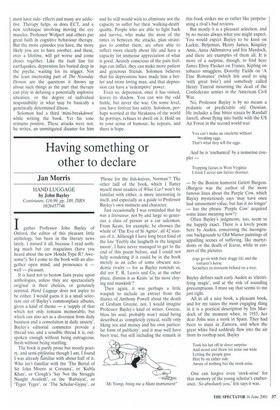Having something or other to declare
Jan Morris
HAND LUGGAGE by John Bayley Continuum, £16.99, pp. 189, ISBN 0826457746 Igather Professor John Bayley of Oxford, the editor of this pleasant little anthology, has been in the literary news lately. I missed it all, because I read nothing much but car magazines (have you heard about the new Honda Type R? Awesome!). So I come to the book with an altogether open mind, and pronounce it — well — pleasant.
It is hard not to bestow faint praise upon anthologies, unless they are spectacularly original in their choices, or genuinely seminal. Hand Luggage does not aspire to be either. I would guess it is a small selection out of Bayley's commonplace albums, given a kind of theme — a 'supply of that which not only remains memorable, but which can also act as a diversion from daily business and a consolation in daily anxiety'. Bayley's editorial comments provide a thread too, and a sensible thread it is, outspoken enough without being outrageous, fresh without being startling.
The book is partly prose but mostly poetry, and semi-philistine though I am, I found I was already familiar with about half of it. Who isn't familiar with the 'The Burial of Sir John Moore at Corunna', or `Kubla Khan', or Clough's 'Say Not the Struggle Naught Availeth', or the `Rubaiyar, or `Tyger Tyger', or 'The Scholar-Gypsy', or
'Phone for the fish-knives, Norman'? The other half of the book, which I flatter myself most readers of What Car? won't be familiar with either, is more interesting in itself, and especially as a guide to Professor Bayley's own instincts and character.
Just occasionally I was reminded that he was a litterateur, not by and large so generous a class of person as a car salesman. From Keats, for example, he chooses the whole of 'The Eve of St Agnes', all 42 stanzas of it. Although I have long been fond of the line 'Feebly she laugheth in the languid moon', I have never managed to get to the end of this poem before, and I could not help wondering if it could be in the book merely as an echo of some obscure academic rivalry — for as Bayley reminds us, did not F. R. Leavis and Co, at the other place, dismiss it as Keats 'at his most cloying and mawkish'?
Then again, it was perhaps a little waspish to include an extract from the diaries of Anthony Powell about the death of Graham Greene, not, I would imagine Professor Bayley's kind of writer. Greene, bless his soul. probably won't mind being described as 'completely cynical, really only liking sex and money and his own particular form of publicity', and it may well have been true, but still including the remark in
You can't make an omelette without breaking eggs.
That's what they tell the eggs.
And he is 'enchanted' by a nonsense couplet —
Trapping fairies in West Virginia
I think I never saw fairies skinnier.
— by the Boston humorist Gelett Burgess. (Burgess was the author of the more famous lines about the Purple Cow, which Bayley mysteriously says 'may have once had amusement value, but has it no longer'
— has the phrase 'Purple Cow' acquired some inner meaning now?) Often Bayley's judgments, too, seem to me happily exact. There is a lovely poem here by Auden, concerning the incongruous backgounds to Old Master paintings of appalling scenes of suffering, like martyrdoms or the death of Icarus, while in corners of the pictures
dogs go on with their doggy life and the torturer's horse Scratches its innocent behind on a tree.
Bayley defines such early Auden as 'electrifying magic', and at the risk of sounding presumptuous, I must say that seems to me just right.
All in all a nice book, a pleasant book, and for my tastes the most engaging thing in it is a poetical description by Iris Murdoch of the moment when, in 1933, her dear John sees a stork in Spain. They had been to mass in Zamora, and when the great white bird suddenly flew into the air from its rooftop nest, Bayley
Took his hat off in sheer surprise And stood and threw his arms out wide Letting the people pass Him by on either side Aware of nothing but the stork-arise.
One can forgive even 'stork-arise' for that memory of the young scholar's exuberance. 'So absolutely you,' Iris says it was.


































































 Previous page
Previous page